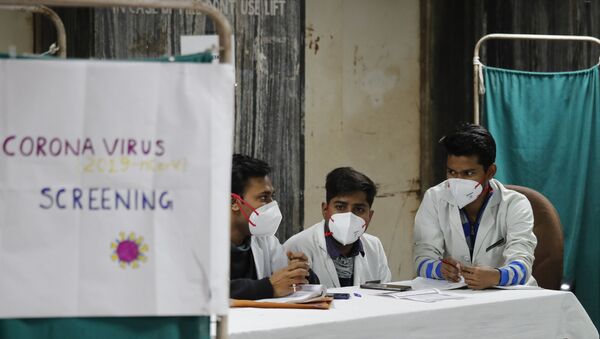In view of the surge in Covid-19 cases in India, especially Delhi, doctors of the nation's most reputed hospitals, the All India Institute of Medical Sciences (AIIMS) favour taking strong measures and ensuring new regulations are in place to curb or bring down the number of Covid-19 cases.
Doctors at India's premier hospital and medical research facility AIIMS have slammed the government for not implementing strict rules and laws to curb the consistent increase in Covid cases.
Over the last two weeks, India has witnessed a huge spike in Covid cases. While several states have imposed some curbs, most of these are actually night curfews which have been slammed by the medical experts for their lack of relevance.
Lockdown – the Need of the Hour
Speaking to Sputnik, a senior doctor at AIIMS said the need of the hour is to implement a new lockdown and take action. People have become too complacent, and hae forgotten about the pandemic.
"The festive season has added to the number of cases. People have flooded the markets and streets as if life is back to normal. People have been flouting the protocol set by the authorities, which has acted as a super spreader,” said Dr. Adarsh Pratap Singh, President, Resident Doctors Association (RDA), AIIMS.
Recently, the government’s think tank NITI Aayog said the weather had a major role in the increasing number of cases.
“The main reason is that coronavirus is a respiratory virus and usually respiratory viral infections have a tendency to increase during the winter season…so we need to be more careful during the forthcoming months,” NITI Aayog member V. K. Paul had told reporters.
COVID-19 Vaccines and India’s Wait
AIIMS Director Dr. Randeep Guleria told Sputnik that pollution has also increased the severity of the infection.
“A lot of people are facing Covid fatigue. It is important that the public becomes a little more patient and waits a few months more till the vaccine is out,” he said.
“In trials, we have been getting reports of vaccine candidates with as high as 90 percent efficacy. We are also hoping that India's vaccine also shows good results. A few months waiting with the vaccine on the market and a lot of lives would be saved,” Dr. Guleria said.
He further mentioned that the plan is to provide the high-risk group of people such as healthcare workers or front line warriors with the vaccine protection first, when it comes.
Speaking about the first Indian-made Covid-19 vaccine COVAXIN, the AIIMS director said that the phase-3 human clinical trial began on Thursday. “We have been receiving good feedback about COVAXIN.”
Similarly, with the Pfizer coronavirus vaccine showing positive results, experts in India have said there is not much hope in it for the country.
Pfizer Inc and BioNTech have said that their coronavirus vaccine candidate has been found to be more than 90% effective in preventing Covid-19.
“The main reason the Pfizer coronavirus vaccine isn't so effective in India is because it has to be kept at -70 degrees Celsius. We will have difficulties in maintaining a cold chain,” Dr. Guleria said.
India Preparing for COVID-19 Vaccines
In a recently-held meeting presided over by Prime Minister Modi he asked the state chiefs to make arrangements for the storage of medicine at such a low temperature. He also discussed the modalities of Covid-19 vaccine delivery, as well as its distribution and administration.
“The costs of the vaccines are yet to be decided. Though two India-based vaccines are at the forefront, we're working with global firms also,” Modi mentioned.
He has also said that the government is keeping a close watch on the development of vaccines and is in contact with global regulators, governments of other countries, multilateral institutions and international companies.
“Safety is as important as speed for us, whichever vaccine India will give to its citizens will be safe on all scientific standards. The vaccine for citizens will meet all necessary scientific criteria. The priority will be to ensure that the vaccine reaches everyone. State governments along with the authorities at all levels will have to work together to ensure that the vaccination drive is smooth, systematic and sustained,” Modi mentioned.
COVID-19 Pandemic- a Challenging Time for India
To curb the spread of the contagious virus, the Government of India imposed a nationwide lockdown on 25 March. It brought almost everything involving public movement or gathering to a halt. The lockdown lasted until the end of May, after which the country started unlocking in different phases, relaxing many curbs.
Hundreds of thousands of migrant workers were badly affected in different parts of the country due to affect on livelihood after markets’ shutdown.
As per the government data, India has recorded 9.2 million Covid-19 cases including 135,225 deaths so far. On the positive side, 8.6 million people have recuperated from the virus.
Meanwhile, the Government of Delhi has told the High Court that it is considering imposing a night curfew in the wake of rising cases in the national capital city.


